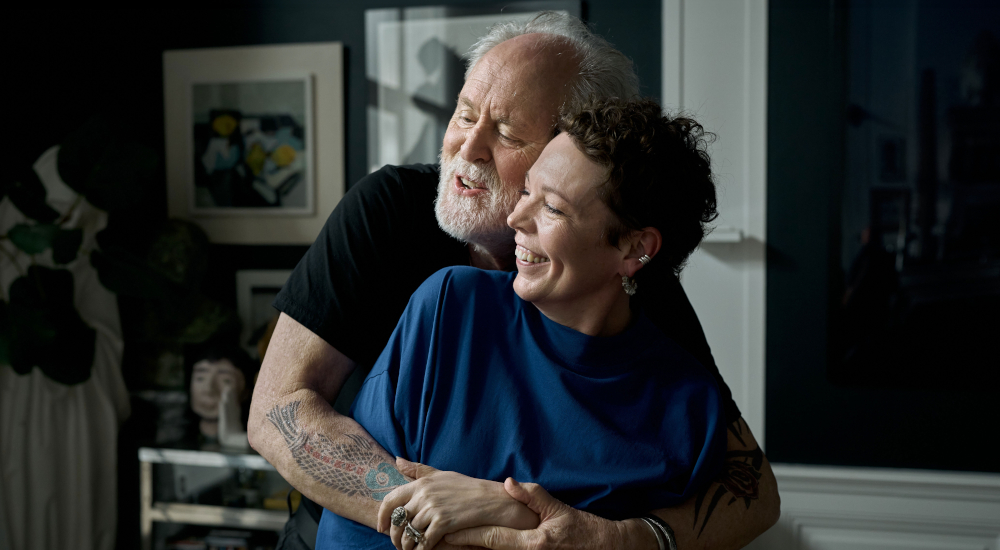"Be grateful, and then fucking move on."
Beautifully encapsulating our complex universe, Sophie Hyde's Jimpa analyzes the mosaic world of gender identity. Using authentic, everyday conversation to highlight the struggles that often divide the queer community, the film authentically showcases conflict (and kindness) through the eyes of a multi-generational family, all of whom share a different level of understanding and acceptance of the lives that exist around them.
Olivia Colman stars as Hannah, a filmmaker (daughter, mother, and woman) who, after some convincing, travels to Amsterdam with her nonbinary teenager Francis to visit their gay grandfather, Jim (a heroically cast John Lithgow). While the trip is supposed to only last a couple of weeks, Francis (Aud Mason-Hyde) has other plans, packing enough to stay abroad for a year. The unexpected and ill-timed request puts Hannah on her heels, forcing her to reconsider her beliefs about parenting and how she wants to interact with her child.
The film, a prominent examination of the LGBTQIA+ community, is simple in context but offers a plethora of complex, layered characters that force you to think and self-analyze. The honest and genuine dialogue generates several natural conversations that call into question ideologies without overstepping a self-evident line.
Jimpa, a lifelong advocate for gay rights, is living with HIV. His diagnosis is brought up on several occasions, oftentimes as it relates to his advocacy. But never is his story defined by his diagnosis. Hyde respects her characters, understanding their history and education on the subject. They equally respect their viewers, who they, by proxy, assume to have the same level of education and understanding of the disease.
The stance is remarkable and a huge step forward in cinema, as Jimpa's diagnosis never plays into his storyline. Instead, it is merely a quality of his persona that has pushed him along his life journey.
Colman, as one would expect, is a pure tour de force. Her portrayal of a mother hell-bent on creating an open, safe space for their child to explore and experiment is nothing short of admiral. But, in doing so, she unearths a vulnerability that showcases the constant sacrifice she makes for those she loves.
Together, Colman and Lithgow complement one another to sheer perfection. Going stride for stride, you quickly believe them to be of the same DNA. Even though Jimpa left the family when Hannah was a young child, the genetic influences shine through, marking a testament to both their performances.
In one scene, as Jimpa shares a table with his family and friends, a conversation takes place regarding bisexuality and the modern generation's free use of the gender identity spectrum. What could be a hostile exchange is kept at bay, in large part due to stellar writing from Hyde and co-collaborator Matthew Cormack. But outside of the script, the chemistry within the entire cast ultimately allows Jimpa to push hard against the proverbial ceiling without feeling the need to break through the glass.
Even beyond that, Jimpa flourishes as it assuredly pushes boundaries, taking a controversial subject matter and handling it with a simple, composed approach that gives the story an unusually calm sense of authenticity. The story never outgrows its characters, nor does Hyde lose sight of the end goal. Instead, the film weaves within a preset metric, allowing everything to flourish as it explores the complex lives of the queer community, all while staying true to the family that sits at its core.
And no, the film is not perfect. Far from it, in fact. But with a whirlwind of side stories, often lost within passing dialogue, the film is, unfortunately, an all too accurate representation of real life. Refusing to slow down for the ordinary viewer, Jimpa is not a film for everyone. That is, sadly, an undeniable fact. But for those who relish in the explorative character study, Hyde's queer-centric narrative will bring a tear to your eye as you connect and sympathize with the beautiful, heartfelt story that displays the intricacies of modern life.

